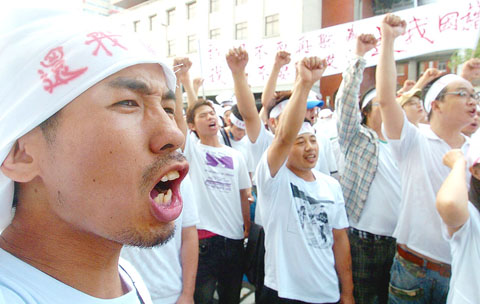More than 400 descendants of former Chinese Nationalist Party (KMT) soldiers who were left behind in Myanmar and Thailand 60 years ago demonstrated yesterday in Taipei, demanding the government grant them citizenship.
Following the KMT’s defeat in the Chinese Civil War 60 years ago, tens of thousands of its soldiers moved across the Chinese border into Myanmar and Thailand.
They became trapped there when the KMT regime collapsed in China and fled to Taiwan.

PHOTO: CHANG CHIA-MING, TAIPEI TIMES
When the governments of Myanmar and Thailand refused to grant them residency or citizenship, they became stateless.
“Although they’ve always been stateless, the government has, in the past, allowed them to come to Taiwan to study and granted them citizenship right away — sometimes within one week or one day,” said Liu Hsiao-hua (劉小華), executive director of the Thai-Myanmar Region Chinese Offspring Refugee Service Association.
Since none of them hold Thai or Myanmar citizenship, they had to come to Taiwan with forged or bought passports.
“But the government told them as long as they could get to Taiwan, it didn’t care how they did it,” Liu said.
The situation changed in May 1999 when the Immigration Act (移民法) was revised and the provision was canceled, Liu said.
However, the Overseas Compatriot Affairs Commission (OCAC) and the Ministry of Education (MOE) did not publicize the new policy and continued to recruit students in those areas.
“I came to Taiwan in 2000 and was told by the MOE that I may get permanent residency in Taiwan after five to seven years,” said Wan Chien-chu (王建菊), who came from northern Thailand and graduated from the National Taipei College of Business in February.
“I’ve received my degree, but without proper documents, I cannot take any national exams for a license and therefore I cannot work,” she said.
This was also the case for Huang Chien-pang (黃建邦), who said that his family has “been stateless for three generations.”
“After buying a forged passport and paying my tuition, I’m NT$120,000 [US$3,950] in debt,” Huang said. “So I had to quit school and began working as a construction worker to make about NT$10,000 to NT$20,000 a month.”
Huang added that without proper documents, he can’t do anything if he’s not paid, and has to pay the full cost when seeing a doctor as he has no health insurance.
However terrible their life in Taiwan is, there is no way back either.
“Since most of them came on forged passports, the Myanmar and Thai governments will not allow them to return — so they’re trapped,” Liu said.
After demonstrating outside the Legislative Yuan, they moved on to the Executive Yuan, where they were invited inside to talk with two low-level officials.
However, the representatives left the Executive Yuan disappointed.
“They only said that they would study the possibility of revising current laws, but wouldn’t give us a concrete timetable,” Liu said. “Before any changes in the law, they [the students] will still have to live illegally — meaning that they’re breaking the law even for walking on the street.”

Taiwan is stepping up plans to create self-sufficient supply chains for combat drones and increase foreign orders from the US to counter China’s numerical superiority, a defense official said on Saturday. Commenting on condition of anonymity, the official said the nation’s armed forces are in agreement with US Admiral Samuel Paparo’s assessment that Taiwan’s military must be prepared to turn the nation’s waters into a “hellscape” for the Chinese People’s Liberation Army (PLA). Paparo, the commander of the US Indo-Pacific Command, reiterated the concept during a Congressional hearing in Washington on Wednesday. He first coined the term in a security conference last

Prosecutors today declined to say who was questioned regarding alleged forgery on petitions to recall Democratic Progressive Party (DPP) legislators, after Chinese-language media earlier reported that members of the Chinese Nationalist Party (KMT) Youth League were brought in for questioning. The Ministry of Justice Investigation Bureau confirmed that two people had been questioned, but did not disclose any further information about the ongoing investigation. KMT Youth League members Lee Hsiao-liang (李孝亮) and Liu Szu-yin (劉思吟) — who are leading the effort to recall DPP caucus chief executive Rosalia Wu (吳思瑤) and Legislator Wu Pei-yi (吳沛憶) — both posted on Facebook saying: “I

Sung Chien-liang (宋建樑), who led efforts to recall Democratic Progressive Party (DPP) Legislator Lee Kun-cheng (李坤城), was released on bail of NT$80,000 today amid outcry over his decision to wear a Nazi armband to questioning the night before. Sung arrived at the New Taipei District Prosecutors’ Office for questioning in a recall petition forgery case last night wearing a red armband bearing a swastika, carrying a copy of Adolf Hitler’s Mein Kampf and giving a Nazi salute. Sung left the building at 1:15am without the armband and covering the book with his coat. Lee said today that this is a serious

A mountain blaze that broke out yesterday morning in Yangmingshan National Park was put out after five hours, following multi agency efforts involving dozens of fire trucks and helicopter water drops. The fire might have been sparked by an air quality sensor operated by the National Center for High-Performance Computing, one of the national-level laboratories under the National Applied Research Laboratories, Yangmingshan National Park Headquarters said. The Taipei City Fire Department said the fire, which broke out at about 11am yesterday near the mountainous Xiaoyoukeng (小油坑) Recreation Area was extinguished at 4:32pm. It had initially dispatched 72 personnel in four command vehicles, 16